Testing for Bad Breath
According to studies fifty percent of the population has bad breath. If you had bad breath, would anyone tell you?
A complex machine is available to test for bad breath but it is costly, not widely available and used mostly in research. Simple is better
Several self tests for bad breath are touted on the internet including scrapping your tongue with a spoon and smelling it, licking the back of you hand and smelling it. The simplest test is to ask a true friend, one you can trust to tell you
Unfortunately for some reason one of the most taboo subjects in our society and among couples and friends is bad breath. No one wants it. No one wants to be around it or kiss it, and yet no one wants to tell anyone they have it either. The fear of bad breath is so great that some people suffer from a phobia called halitophobia—– even though they do not have it. One of the problems is that the human nose acclimates to smells so that self diagnosis is not easy.
 So lets talk frankly and openly about bad breath. If fifty percent of the population has bad breath we all must know someone who has bad breath. Actually I believe at sometime all of us have had bad breath whether it is “morning breath” or “onion breath.” What we all want to know is how to prevent it and cure it. The causes of bad breath are many so let us deal with the less offensive ones first.
So lets talk frankly and openly about bad breath. If fifty percent of the population has bad breath we all must know someone who has bad breath. Actually I believe at sometime all of us have had bad breath whether it is “morning breath” or “onion breath.” What we all want to know is how to prevent it and cure it. The causes of bad breath are many so let us deal with the less offensive ones first.
Food Breath
I call it “Food breath,” but it is actually just another example of you are what you eat. If you or your friends do not like the smell of onions or garlic, don’t eat onions or garlic. I was amazed after listening to a morning radio show where they put garlic in some rubber boots and had a person put them on. Within minutes their breath smelled of garlic. So, wearing or eating garlic may have some wonderful health benefits including warding off vampires, but you are going to have garlic breath. 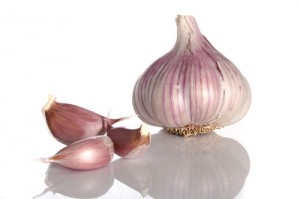 Apparently garlic is absorbed through the skin and exhaled from the lungs. You can temporarily mask the smell with mouth wash, but if it is coming out of your blood stream via your lungs and pores, I do not know how much good it will do. Another thing I’m not sure of is how long the garlic stays in your system before it stops affecting your breath. Which is worse cooked or raw? From personal experience fresh onions seem to stay with me longer.
Apparently garlic is absorbed through the skin and exhaled from the lungs. You can temporarily mask the smell with mouth wash, but if it is coming out of your blood stream via your lungs and pores, I do not know how much good it will do. Another thing I’m not sure of is how long the garlic stays in your system before it stops affecting your breath. Which is worse cooked or raw? From personal experience fresh onions seem to stay with me longer.
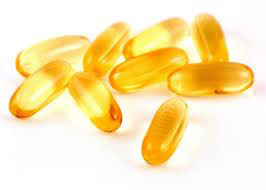 Nutritional supplements are another example of a smell that lingers. In the dental office we can often tell which patients have been taking fish oil supplements because, you guessed it their breath smells fishy.
Nutritional supplements are another example of a smell that lingers. In the dental office we can often tell which patients have been taking fish oil supplements because, you guessed it their breath smells fishy.
Treatment for Food Breath:
Remember you are what you eat. If its a romantic date do not eat garlic bread. Masking with mouthwashes, and gum, can help but if the smell is in your blood stream it is only temporary. Quick note: cinnamon has been shown to be the best at masking offensive odors and also has an antibacterial action. Good oral hygiene can help to get the offensive food particles from in between the teeth.
Systemic Disease Bad Breath
Approximately ten percent of bad breath is caused by systemic or metabolic diseases. These diseases cause distinctive breath smells caused by the chemicals they produce. Diabetes, kidney failure and liver failure can cause a distinctive fishy smell. A fruity breath is associated with ketone bodies released from uncontrolled diabetes. Obviously, they are not a very common cause of bad breath, but if you are unable to resolve bad breath with the methods we describe you might want to visit a doctor.
Poor Oral Hygiene Breath
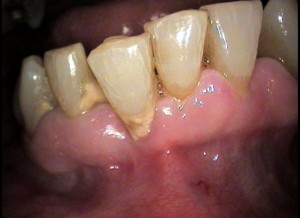 A more common source of bad breath is simply poor oral hygiene; food and bacteria that are not cleaned adequately from the teeth. Pre-digested food left between your teeth is like leaving food over night on the kitchen counter in a warm pot, it simply rots and smells. Flossing and brushing aren’t just to prevent cavities, they help to prevent this kind of bad breath. Patients with periodontal disease and deep pockets around their teeth provide perfect places for the food and bacteria to lodge creating bad breathe. The kind of bacteria that produce the worst smells do not like oxygen and the deep pockets around the teeth created by periodontal disease provide a perfect environment for the production of these smells.
A more common source of bad breath is simply poor oral hygiene; food and bacteria that are not cleaned adequately from the teeth. Pre-digested food left between your teeth is like leaving food over night on the kitchen counter in a warm pot, it simply rots and smells. Flossing and brushing aren’t just to prevent cavities, they help to prevent this kind of bad breath. Patients with periodontal disease and deep pockets around their teeth provide perfect places for the food and bacteria to lodge creating bad breathe. The kind of bacteria that produce the worst smells do not like oxygen and the deep pockets around the teeth created by periodontal disease provide a perfect environment for the production of these smells.
Treatment for Poor Oral Hygiene
Improved oral hygiene and regular professional cleanings are the most effective way to prevent this type of bad breath. This is our specialty and we work hard to help our patients maintain their oral health and fresh breath with proper toothbrushing and flossing techniques. By working together as a team to teach and provide you the tools to help achieve and maintain good oral health, we can stop bad breath and prevent dental problems. Masking the offensive smell with mouthwashes and gum can work temporarily but it will not significantly improve you oral health.
Tonsillar Bad Breath
Tonsillar bad breath is created when calcium deposits get caught in the tonsillar folds at the back of your throat. You can not see them as they are hidden in the folds. They are usually discovered when you cough or hack up white deposits that look like milk curds and have a putrid smell. They seem to be related to dairy products, sugar, dry mouth and post nasal drip. Here is a link to a an informative video about tonsillar stones.
Treatment for Tonsillar Bad Breath
Treating the postnasal drip and using warm salt water rinses to flush the tonsils can help to prevent this source of bad breath. Some mouthwash/ oral hygiene systems claim also to prevent the deposits from developing. I do not know how but some people even manage to brush their tonsils without gagging and throwing up. Again mouthwashes and gum can help to temporarily mask the odor.
Dry Mouth/ Xerostomia Breath
Morning breath created by a dry mouth, perhaps from a night out on the town drinking is created by a lack of saliva (alcohol is dehydrating). Saliva serves many purposes but one of its most important is to help purge the food debris from in between the teeth. As we have mentioned previously, food decaying between the teeth releases gases that no one wants to smell. In addition the saliva contains antibodies which seem to help stop the bacteria from getting organized. Dry mouth bad breath can also be created by some autoimmune diseases and many medications used to treat high blood pressure, pain, and anxiety.
Treatments for Dry Mouth Breath
Drinking water of course is helpful. Chewing gum can help to stimulate salivary flow. We recommend gum containing the sugar xylitol or trisclon because it makes it difficult for the bacteria to produce acid and decay which can be a significant problem for those with reduced saliva. Special mouthwashes, lozenges, and pastes made by Biotene are available to ease the symptoms also.
Tongue Breath
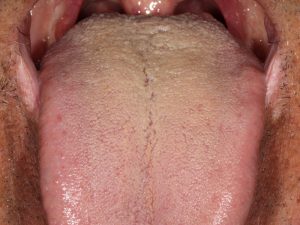 We have saved the worst, most chronic and most common source of bad breath for last. We have all smelled it, that putrid breath you can smell from five feet away. You sometimes can not even tell who it is coming from because you can smell it from so far away. Up close you do not even want to have a conversation with this person because their breath will be directed at you. My biggest nightmare is to be stuck on a long plane flight seated next to a person with this kind of breath. I often wonder, doesn’t this person smell it themselves, or why hasn’t someone told them? Unfortunately it seems that people’s sense of smell accommodates to the smell of their breath, and as previously mentioned, the subject of bad breath is a sensitive one even in the dental office. The good news is that this type of bad breath is treatable if you simply treat the most common source: the tongue. The actual cause of the smell is bacteria that metabolize the dead cells and food found in the crevices on the tongue and produce a gas containing sulfur, the same element that gives rotten eggs their wonderful smell. Sterilizing the tongue or the mouth is impossible but we can disrupt the bacteria and remove the dead cells and food by cleaning the surface of the tongue with a tongue scrapper. In fact, if you stick your tongue out and see that it is coated you have a higher chance of having bad breath.
We have saved the worst, most chronic and most common source of bad breath for last. We have all smelled it, that putrid breath you can smell from five feet away. You sometimes can not even tell who it is coming from because you can smell it from so far away. Up close you do not even want to have a conversation with this person because their breath will be directed at you. My biggest nightmare is to be stuck on a long plane flight seated next to a person with this kind of breath. I often wonder, doesn’t this person smell it themselves, or why hasn’t someone told them? Unfortunately it seems that people’s sense of smell accommodates to the smell of their breath, and as previously mentioned, the subject of bad breath is a sensitive one even in the dental office. The good news is that this type of bad breath is treatable if you simply treat the most common source: the tongue. The actual cause of the smell is bacteria that metabolize the dead cells and food found in the crevices on the tongue and produce a gas containing sulfur, the same element that gives rotten eggs their wonderful smell. Sterilizing the tongue or the mouth is impossible but we can disrupt the bacteria and remove the dead cells and food by cleaning the surface of the tongue with a tongue scrapper. In fact, if you stick your tongue out and see that it is coated you have a higher chance of having bad breath.
Treatment for Tongue Breath
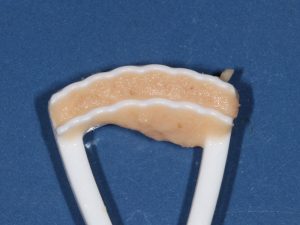 Using a tongue scrapper is initially a challenge especially for gaggers like me, but with practice and experimentation with different tongue scrapers you can get the job done. Believe me once you see what comes off your tongue you will be a convert to daily cleaning of your tongue..
Using a tongue scrapper is initially a challenge especially for gaggers like me, but with practice and experimentation with different tongue scrapers you can get the job done. Believe me once you see what comes off your tongue you will be a convert to daily cleaning of your tongue..
Using chemicals to clean the crevices, disrupts the bacteria may help to mask the odor. Several chemicals including stanneous flouride and triclosan found in many toothpastes and mouthwashes have been shown to reduce the bacteria. In addition, chlorine dioxide in a water pick seems also to reduce the bacteria and mouth odor. A prescription mouthwash like peridex can also help but it leaves the teeth with an ugly brown stain.
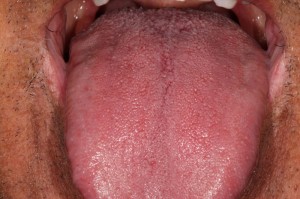 If you know someone with bad breath rather than dealing with the uncomfortable conversation of telling them they have bad breath perhaps just suggest to them you have discovered tongue cleaning and found your breath and mouth feel so much better. Believe me if you can get someone to scrape their tongue once, they will be so disgusted they will continue.
If you know someone with bad breath rather than dealing with the uncomfortable conversation of telling them they have bad breath perhaps just suggest to them you have discovered tongue cleaning and found your breath and mouth feel so much better. Believe me if you can get someone to scrape their tongue once, they will be so disgusted they will continue.
Bad breath doesn’t need to be a significant worry as it is treatable by following a regimen involving dietary control, good oral hygiene and tongue cleaning.
